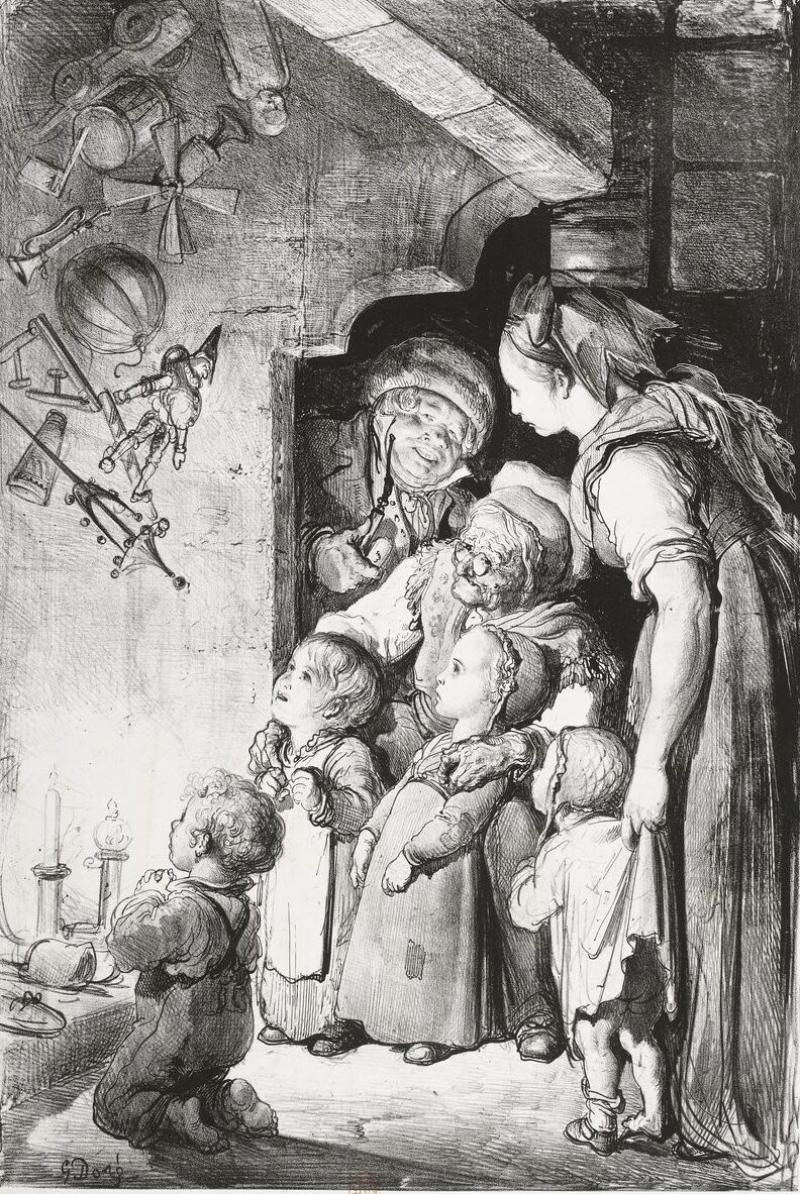Long-Lost Christmas Eve Traditions - Medievalists.net
Category: History & Sociology
Via: john-russell • last year • 1 commentsBy: Email Octopus (Medievalists. net)



by Medievalists.netDecember 24, 2023
By Lorris Chevalier
How did people in centuries past celebrate Christmas Eve? Here are a few examples from pre-modern France.
A Swimming Race in Beaufort
This tradition happened in Beaufort, a city in Anjou, France. A very old custom used to take place of which there is no trace in the country's traditions. It was a custom in Beaufort for all the young people married during the year to get together on Christmas Eve, to offer the public great entertainment. At the appointed time, they went, escorted by the whole crowd, to a bridge located over a small river, at the end of the town.
There, at the signal given by the chief magistrates of the city, and in the presence of the lord of the place who presided over the ceremony, they rushed into the water to catch, while swimming, a ball that had been thrown into the current. The swimmers had the freedom to snatch the ball from the hands of those who had grabbed it first; it was, one can imagine, a very long and very distracting struggle. The one who, the strongest or the most skillful, managed to master the ball was proclaimed the winner. He received fifty pounds to "set up his household" and was taken home to the sound of the trumpet, and the noise of drums, fifes and oboes. Those young people who, not being sick, "did not want to shiver while swimming after the pelota", paid a fine for the winner.
A Ball Game in Normandy
A roughly similar custom took place in Normandy, in Mesnil-sous-Jumieges and in Yville. The last bride of the year - and it was who would marry last to have this honor - in the presence of the entire assembled parish, threw over the church a ball or a ball containing a sum of money. Everyone was doing their best to get hold of it. However, to remain master of it, you had to go home and make it "kiss" the yule log in the fireplace. Whoever touched the carrier shouted to him: "Drop the ball," and again the ball was thrown. Often this game of thrown ball lasted a very long time, and sometimes the lucky owner of the ball remained away from the village two or three days before returning home, waiting until his opponents, tired, had given up the game.
A sort of superstition was involved, the ball bringing good luck to the hamlet that owned it. It was a talisman which ensured good harvests to those who could keep it. The December 25, 1898, the Journal de Rouen reports that all this was very harmless, but the jostling and the batteries that followed were less so, and in 1866, this original Norman custom was definitively suppressed.
Firey Festivals in Champagne
On Christmas Eve in the villages of Champagne, other traditions took place. It is at nightfall that the Christmas celebrations begin. As soon as the last light of day has faded into darkness, all the inhabitants of the country take great care to put out their fireplaces, and then they go in crowds to light torches from the church lamp. When these firebrands have been blessed by the clergy, they take them out through the fields: this is what we call the Flambart festival. These flambarts are the only fire that burns in the village: this blessed and regenerated fire will throw young sparks onto every household fireplace, as a symbolic image of the spiritual rebirth brought to the world by Christ.
Then it was time to light the Yule log. During the vigil, the peasants, on the esplanade and in the courtyards, indulged in a thousand pleasant pastimes and entertain themselves. Some pretended to want to take the moon with their teeth, others to break a needle with their knees, others to stifle the four winds. But all the games stopped at midnight, as the bells rang in the darkened air. From all sides, long lines of parishioners came to the church carrying tarred firebrands, and torches of fiery peace which spread wide light over the dazzling countryside and make the frost sparkle at the lower edges of the fences.
Christmas Eve in Rouergue
Here is the description of a Christmas Eve in Rouergue, located in southern France.
In the vast arid plains of the Causse, as in the mountains of Levezou and the wooded hillocks of Segala, it is very cold towards the end of December; Also, we do not spare the wood in the vast fireplace around which the whole family gathers for the vigil. In the past, the neighbours would arrive too; We gathered together, in large numbers, sometimes at one's house, sometimes at another's, we chatted happily, without constraint or embarrassment of any kind, nibbling on tasty roasted chestnuts and washing them down with cider or white wine
Grouped around a large fire, the family chats quietly: suddenly, the bells are heard. "The chimes!" " (Carillon !) says one of the elders, and thereupon, to satisfy the eager curiosity of the young people, we recall all the ancient legends of the Christmas festival, which everyone already knows, but which always please. It is said that the bells of some old destroyed parish, thrown into deep abyss by heretics, begin to ring of their own accord to respond to the joyful chimes of their sisters who sing so gaily in the village bell tower.
Before leaving for Midnight Mass, we placed the Yule log. According to tradition, the Yule log, in any self-respecting house, must last until January 1st, and even, to ensure a happy and prosperous year, it must burn without going out until 'at Epiphany, so that, if the Three Wise Men come to pass by there, they will have something to warm their tired and frozen limbs by the harsh breeze of our mountains. Also there are whole trees or immense oak stumps that are carried by three or four farmhands into the gigantic fireplace in the kitchen.
The Pious Girl
A most edifying and touching custom happened in the village of Montsecret, in Orne. The day before and on the morning of Christmas Day, a pious young girl esteemed by all goes through the houses carrying the Child Jesus from the Crib and has him kissed by the little children. The parents then give an offering for the maintenance of the lamp which, throughout the month of January, burns in the church in front of the Nativity. This visit is seen as an honor and a blessing by the families: the children look forward to it and welcome it with joy.
Dr Lorris Chevalier, who has Ph.D. in medieval literature, is a historical advisor for movies, including The Last Duel and Napoleon.

Tags




Who is online
409 visitors
